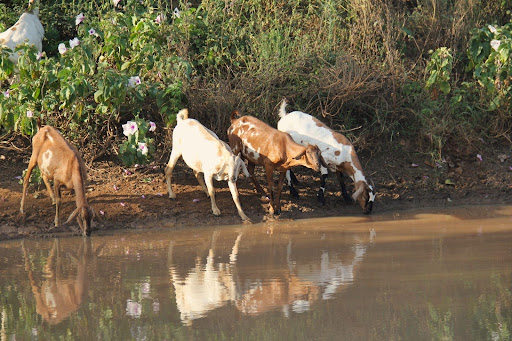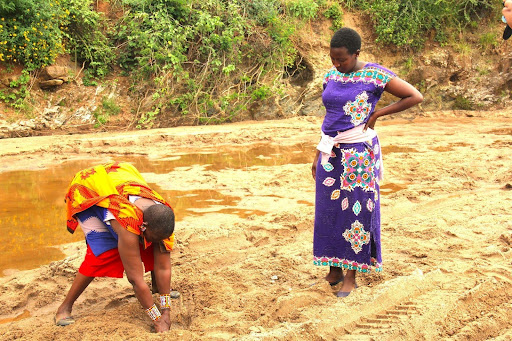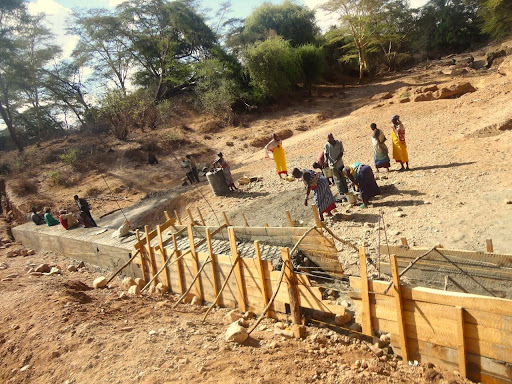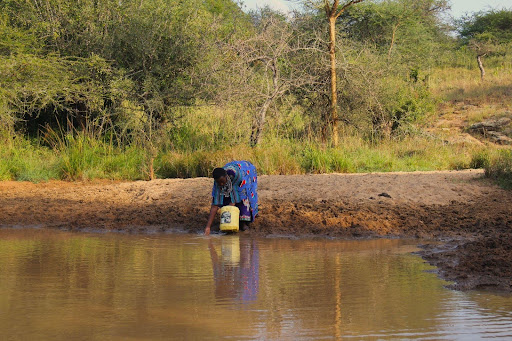By Arasha Soila
Kajiado County, Kenya: In Kenya’s Kajiado County’s arid landscape, women spearhead water conservation efforts, using traditional techniques to ensure a sustainable water supply and improve community resilience against drought.
In Kajiado Central, Olgos village endures an arid landscape with sparse rainfall and frequent droughts. Vegetation is scarce, and the sun beats down relentlessly, making water a precious and often elusive resource. This scarcity significantly impacts residents, especially women, who are the primary caregivers.
Despite these hardships, the indigenous women of Olgos have become custodians of water, using age-old techniques to sustain their families and livestock through droughts.
Founded in 2018 in response to the increasing challenges posed by climate change, the Engape Group focuses on local water management. This collective of 23 women employs traditional water conservation methods, such as sand pits, sand dams, earth pans, and shallow wells, to ensure a consistent and reliable water supply throughout the year.
Peninah Moitaso, an Engape Group member, highlights the cultural heritage of these techniques. These water conservation methods have been a part of our culture for generations she says. “Our grandmothers and mothers taught us how to build and maintain them. They are deeply embedded in our traditions and are more than just survival strategies. “The Engape Group has implemented several projects that have significantly impacted the community. One such project is the construction of earth pans, which collect and store rainwater. “An earth pan is constructed where water naturally accumulates, such as in a low-lying area. Rainwater and surface runoff fill the pan during the rainy season, providing a vital water source throughout the dry season,” explains Moitaso.

Another technique is the sand pit, which harvests and stores rainwater in sandy soils. “Sandpits provide a reliable water source during dry seasons, ensuring access even when surface water dries up. They recharge local groundwater tables and improve overall water availability,” says Naomi Moitaso, another member of the Engape Group. “These methods ensure we have clean water for drinking and other uses, reducing the burden of fetching water from distant sources.”

Statistics back the success of these traditional methods. According to a 2019 report by the Ministry of Water and Sanitation, water access in Kajiado County has increased by 15 percent since implementing community-driven water projects, highlighting the effectiveness of local initiatives in addressing water scarcity.
Agnes Bene, one of the group’s founders, notes the cultural and environmental challenges women face in her community. “Men often do not participate in water conservation efforts and contribute to the problem by harvesting sand, which dries up rivers and exacerbates water scarcity,” she explains. “The rivers, once pristine water sources, have been destroyed by sand harvesters. Men take livestock to water sources first, which culturally means that the livestock must drink before women can fetch water. This practice forces women to wait, further exacerbating their struggle for water access.”
The situation in Kajiado County mirrors broader trends in the Nile Basin, where water scarcity is a growing concern. According to the World Bank, over 250 million people rely on the River Nile for their daily water supply. With the population expected to double by 2050, the pressure on water resources is set to intensify, making sustainable water management practices more critical than ever.
Engage Group’s water conservation efforts provide practical solutions and foster economic and social empowerment among women. “Our projects have transformed our lives by providing a constant water source when surface water is scarce. Reliable water has significantly improved our hygiene and health, reducing waterborne illnesses,” says Bene.

The group’s initiatives have received support from the Neighbours Initiative Alliance (NIA), an NGO that has provided training and resources for effective water management. “Through capacity strengthening and knowledge transfer, NIA has equipped us to implement sustainable water projects. This support ensures the longevity of our efforts and empowers community members, especially women, in water security and management,” adds Bene.
The Engape Group envisions a future where water becomes more accessible to women in their community. They aim to construct more shallow wells and boreholes, reducing the burdensome distances women currently travel in search of water. The group is also working to halt sand harvesting, which depletes the water table and exacerbates water scarcity.
These women are not just surviving but leading the way in sustainable community water management. Their efforts highlight the power of traditional knowledge and community-driven solutions in tackling modern challenges and women’s critical role in addressing water scarcity and climate change, providing a blueprint for similar initiatives across the Nile Basin.
This story was first published in “The New Edition of the MiCT The Niles Magazine: Where a woman rules, streams run uphill” and produced with the support of the Nile Basin Initiative.














